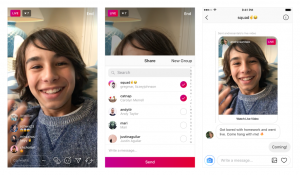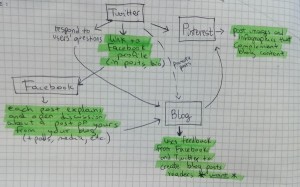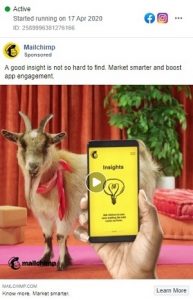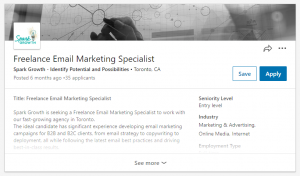
The highest performing talent acquisition professionals today are those who understand the importance of content. Their success springs from a superior command over recruitment marketing strategies, filled with captivating storytelling and actionable intelligence. Even large enterprises are discovering this. Last fall, GE reinvented its long-standing brand to reflect a move toward digital, rather than mechanical, engineering. It launched a heavily content-driven campaign to explain its new model to customers. What it never imagined was an 800-percent increase in job applications. Content is king, as GE’s marketing illustrates. And recruiters can achieve the same stellar results.
How a Fictional Character Accidentally Became GE’s Recruiter Extraordinaire
Many of you have probably seen the humorously self-aware GE commercials. They poke good-natured fun at the company’s traditional image while offering a send up of Silicon Valley culture. The spots are clever parodies of the startup mindset that prevails in motivated Millennials, juxtaposed against the challenges facing industrial monoliths as they transition to the digital age.
As Joe Lazauskas explains in The Content Strategist, the commercials “follow Owen as he tries to explain his new cool new job developing breakthrough code as a GE engineer to his befuddled friends and family, who think that he’s going to go work on a train or live a life of manual labor.”
GE’s chief marketing officer told Lazauskas in an interview that they were merely looking for a compelling way to talk about the transformation to a digital industrial company. They never set out to create a viral recruitment campaign — yet that’s precisely what materialized. In retrospect, the impressive outcome shouldn’t seem surprising. GE’s leaders took bold steps to connect with their audience as they shaped the organization’s new paradigm.
GE was also one of the first companies in its industry to recognize the power of social platforms such as Instagram, Medium, Vine, Periscope, Twitter and others. Lazauskas reminds us that GE became “obsessed with staying relevant to young, tech-forward audiences.” It’s a vital lesson that applies just as strongly to hungry recruiters.
Candidates today are no longer job seekers. They have become consumers with choices in employment brands, companies and recruiters. Cold calling and job board mining will not reach 100 percent of the talent that recruiters or their clients need. That’s where content comes in. Content continues to increase and permeate the digital world. In the next two years alone, analysts expect the amount of online content to double. Every company and every recruiter seeking talent must become a media entity, enticing workers through content.
We tend to think of Millennials as hyperactive multi-taskers with short attention spans. In reality, they’re voracious readers. They pore over countless pieces of content each day — not just headlines on Twitter. Long-form videos, in-depth articles, podcasts, digital magazines and white-papers are quickly becoming the best ways to capture the interest of future talent. Providing honest and detailed information will drive candidates to you and open the doors for socialization, interaction and recruitment.
Inbound Recruitment Marketing
Recruiting through inbound channels is a lot like modern marketing. In staffing, this practice is evolving and maturing. It has changed the hiring landscape dramatically. If fact, it’s improved the way candidates learn about recruiters, connect with them, and interact with them. Every recruitment team, just as any marketing group, will eventually develop their own best practices for inbound strategies. That said, here are the top three approaches that always prove effective.
Captivating Content
Content creation forms the foundation of inbound recruitment marketing. Through blogs, e-books, social media interactions, infographics and other written resources, you can draw potential candidates to you. Content defines your brand and your abilities to an audience. The best part is that a robust content initiative saves you the time of emailing, calling and job board scraping. When you pique a person’s interests, he or she will come to you.
Search Engine Optimization (SEO)
Search engine marketing simplifies the way candidates discover your content. Although SEO is more technical and “behind-the-scenes” than publishing a great article, it should infuse every aspect of your writing. SEO involves striking the right balance between keywords, advertising and your postings to maximize the position of your content in rankings – whether those appear on job boards, social media or Internet searches.
Storytelling
Today’s consumers, and that includes candidates, pay little attention to content focused on the self-promotion or direct selling of a brand. They gravitate toward content that promises insight, advice, useful tools and guidance. You want to tell a story that intrigues your core audience and provides them resources to succeed. That might sound as though you’re giving away your secrets with no expectation of business in return. In fact, the opposite is true.
By establishing yourself as an expert in your recruiting field – and a professional with a deep desire to help candidates – talent will turn to you as the recruiting agency that will best serve their career needs.
Benefits of Content
Articles have longevity — something lacking in the ephemeral world of social media, where posts are more akin to headlines and passing fancies. A solid blog will endure. That story will continue to have use for a long time. And by publishing relevant pieces again, their inherent value escalates in terms of responses.
A story, not a blurb. When you examine the bulk of social media posts, particularly on micro-blogging sites, you notice that no real story exists — just headlines with links that may never be followed. There are strict limitations in character length, word length and formatting. You want to tell a story that will attract top candidates. It’s the story, not a headline or vague synopsis, that compels these professionals to consider working with your organization.
Content weathers the storms of change. The content you create translates across all domains and platforms. You can pique candidates’ interest from countless devices: computers, tablets, smartphones, smartwear accessories and more. Your slideshows, podcasts, feature articles and infographics can also be promoted on social networks or other sources you’re utilizing. Your content is universal, long-lasting and portable. If it exists, it can be published to any media, reaching any audience.
Create an Inward Flow That Draws Candidates to You
Where outbound marketing often requires buying ads, building email lists and hoping for leads, inbound marketing focuses on the creation of quality content that pulls candidates toward your organization — it explains to talent why they’ll want to be a part of your team. Align the content you publish with the interests of candidates to create an inward flow that naturally attracts prospects who can be converted, hired and delighted over time.
More than Marketing
Marketing, in an academic sense, blends art, applied science, behavioral psychology, research and analysis. Recruitment marketing requires something more nuanced — a message that’s visceral and personal. The institutional orientation of marketing principles matter, of course, yet human resource functions must remain human processes. That is, our most successful techniques for engaging top talent will be those that speak to the heart. Consider customer loyalty.
Why choose one provider over another, when quality and cost are virtually indistinguishable? The short answer is brand. It’s the emotional connection that inspires patronage. The parent of a child with severe food allergies will always choose a store that caters to those needs, even at higher prices. Disabled customers will frequent establishments that care enough to make their experiences convenient and accessible. These same connections and values influence the decisions of job seekers.
Compelling, Authentic and Consistent Messaging
Consistent messaging instills a feeling of familiarity when candidates connect with your social media, website, hiring portal or other marketing properties. The image you want to project should be reflected in your choice of words and tone of voice: casual, businesslike, humorous and so forth. This message should also be applied across all channels. Research your clients, open positions and candidate parameters to answer these critical questions:
- Who are the people I should and will be talking to?
- What language do they use in their natural conversations, and what words should I use to inspire this audience or match their styles?
- Where is my audience gathering and interacting: social networks, email, websites, photo-sharing sites, industry groups, etc.?
- What motivates the ideal candidates for the positions I’m trying to fill?
Develop a Recruitment Brand
Candidates want to ensure that their goals, passions and values match those of prospective employers. They seek the same from the recruiting professionals they’re trusting to curate the hiring process. They want to know that your team is knowledgeable, effective, collaborative, connected and ready to champion them. A strong recruitment brand helps establish trust and comfort. It demonstrates a comprehensive grasp of the culture and values inherent in your firm and your clientele, while articulating your expertise in filling positions. Here are some elements of an engaging recruitment brand:
- Experience, qualifications and specialties
- The types of positions and industries at which the recruiter excels
- Your accomplishments and record of success
- Proof that you pay attention to the candidate experience
- Examples of how you advocate for your clients and talent
New Age, New Recruiting
In today’s workforce, the evolving role of recruiters is becoming even more pivotal. Candidates aren’t attracted, sourced and recruited the same way they were a decade ago. Modern talent have different motivators, more choices and greater leverage when considering jobs. The transactional tactics of matching skills, work experience and compensation to job descriptions no longer bear the same fruits. Just like GE, top recruiters can exceed their goals and expectations by perfecting a content-rich marketing approach.
Business & Finance Articles on Business 2 Community(59)






